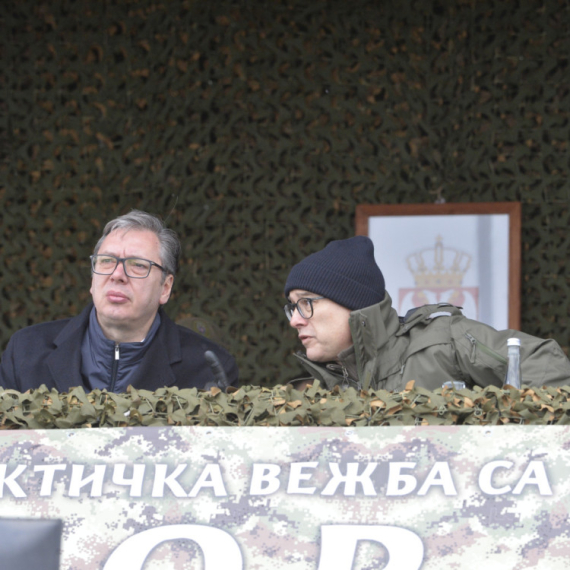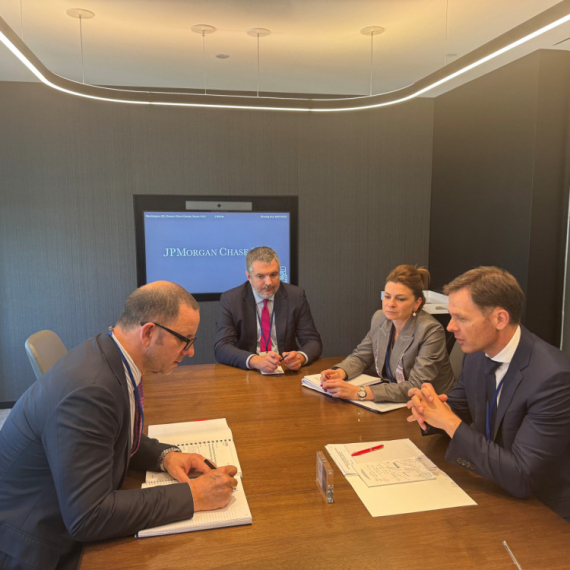PM expecting positive Hague report
Prime Minister Mirko Cvetković says that he is optimistic regarding the report of the Hague Tribunal’s chief prosecutor.
Saturday, 26.07.2008.
13:06

Prime Minister Mirko Cvetkovic says that he is optimistic regarding the report of the Hague Tribunal’s chief prosecutor. "Serbia has respected international law both when it comes to cooperation with the Hague Tribunal and the unilateral declaration of Kosovo’s independence,” Cvetkovic told Beta. PM expecting positive Hague report The prime minister said that he expected the EU to approve the interim trade agreement after hearing Serge Brammertz’s report, adding that this might happen at the next meeting of EU foreign ministers. In the meantime, Serbia will undertake diplomatic activities in order to secure the support of every EU member state for the ratification of the interim agreement, he said "I expect EU policy towards Serbia to ease up after the firm confirmation that Serbia is fulfilling its obligations to the Hague Tribunal,” Cvetkovic said, adding that a significant number of countries had shown appreciation for Serbia’s cooperation with the Tribunal and its respect for international law. The prime minister said that the new government was united in its determination to cooperate with the Hague, adding that certain members of the coalition had called on the remaining fugitives to surrender to the Tribunal voluntarily. He confirmed that the Interior Ministry had not been involved in the arrest of Radovan Karadzic, stressing that Serbian security services had done a good job in arresting the former Bosnian Serb leader. Cvetkovic said that the Belgrade protests sparked by the arrest of Karadzic did not pose a threat to either political stability in the country or to the safety of its citizens. The prime minister said that Serbia would ask the International Court of Justice (ICJ) to declare its position on the legitimacy of the recognition of Kosovo’s independence at the UN General Assembly in September. "Our argument will be that only a small number of countries have recognized Kosovo’s independence, and that there are other countries interested in hearing the ICJ’s position on the issue,” he explained. Commenting on the statement from French Foreign Minister Bernard Kouchner that Serbia should give up on its plan to seek the ICJ’s view on the matter, Cvetkovic said that Serbia would take into consideration the views and statements of all international officials, but that Serbia had the right to consult the ICJ, because the request, in itself, could not harm anyone. The prime minister added that Serbia could expect to gain EU candidate status by late 2008, or early 2009. "Apart from the interim agreement and receiving EU candidate status, our third goal is to get Serbia on to the so-called white Schengen list, which will mean opening the doors of EU countries to Serbian citizens,” he explained. Cvetkovic added that certain technical issues, such as the issuance of new passports, still needed to be resolved before Serbia acceded to the white Schengen list. "How fast Serbia moves towards the EU will depend on the efficiency of parliament,” said the prime minister, adding that he was surprised by the behavior of the opposition parties, who were showing “a great lack of responsibility, when certain decisions need to be taken—decisions that are in the vital interests of Serbian citizens.” He said that once parliament finally started working, the opposition would recognize its position and give up on its conduct thus far. Mirko Cvetkovic (FoNet, archive)
PM expecting positive Hague report
The prime minister said that he expected the EU to approve the interim trade agreement after hearing Serge Brammertz’s report, adding that this might happen at the next meeting of EU foreign ministers.In the meantime, Serbia will undertake diplomatic activities in order to secure the support of every EU member state for the ratification of the interim agreement, he said
"I expect EU policy towards Serbia to ease up after the firm confirmation that Serbia is fulfilling its obligations to the Hague Tribunal,” Cvetković said, adding that a significant number of countries had shown appreciation for Serbia’s cooperation with the Tribunal and its respect for international law.
The prime minister said that the new government was united in its determination to cooperate with the Hague, adding that certain members of the coalition had called on the remaining fugitives to surrender to the Tribunal voluntarily.
He confirmed that the Interior Ministry had not been involved in the arrest of Radovan Karadžić, stressing that Serbian security services had done a good job in arresting the former Bosnian Serb leader.
Cvetković said that the Belgrade protests sparked by the arrest of Karadžić did not pose a threat to either political stability in the country or to the safety of its citizens.
The prime minister said that Serbia would ask the International Court of Justice (ICJ) to declare its position on the legitimacy of the recognition of Kosovo’s independence at the UN General Assembly in September.
"Our argument will be that only a small number of countries have recognized Kosovo’s independence, and that there are other countries interested in hearing the ICJ’s position on the issue,” he explained.
Commenting on the statement from French Foreign Minister Bernard Kouchner that Serbia should give up on its plan to seek the ICJ’s view on the matter, Cvetković said that Serbia would take into consideration the views and statements of all international officials, but that Serbia had the right to consult the ICJ, because the request, in itself, could not harm anyone.
The prime minister added that Serbia could expect to gain EU candidate status by late 2008, or early 2009.
"Apart from the interim agreement and receiving EU candidate status, our third goal is to get Serbia on to the so-called white Schengen list, which will mean opening the doors of EU countries to Serbian citizens,” he explained.
Cvetković added that certain technical issues, such as the issuance of new passports, still needed to be resolved before Serbia acceded to the white Schengen list.
"How fast Serbia moves towards the EU will depend on the efficiency of parliament,” said the prime minister, adding that he was surprised by the behavior of the opposition parties, who were showing “a great lack of responsibility, when certain decisions need to be taken—decisions that are in the vital interests of Serbian citizens.”
He said that once parliament finally started working, the opposition would recognize its position and give up on its conduct thus far.































Komentari 6
Pogledaj komentare